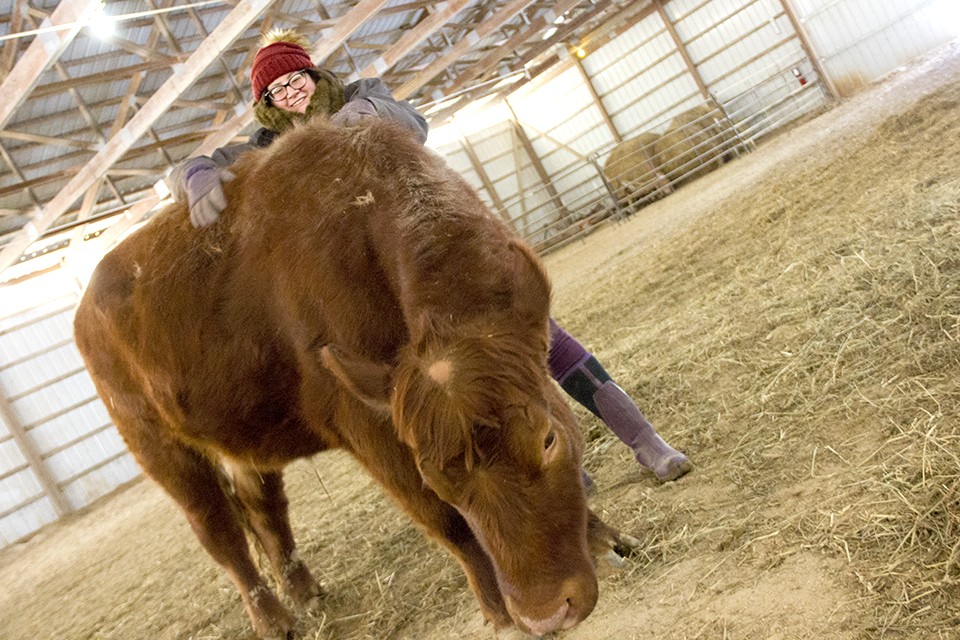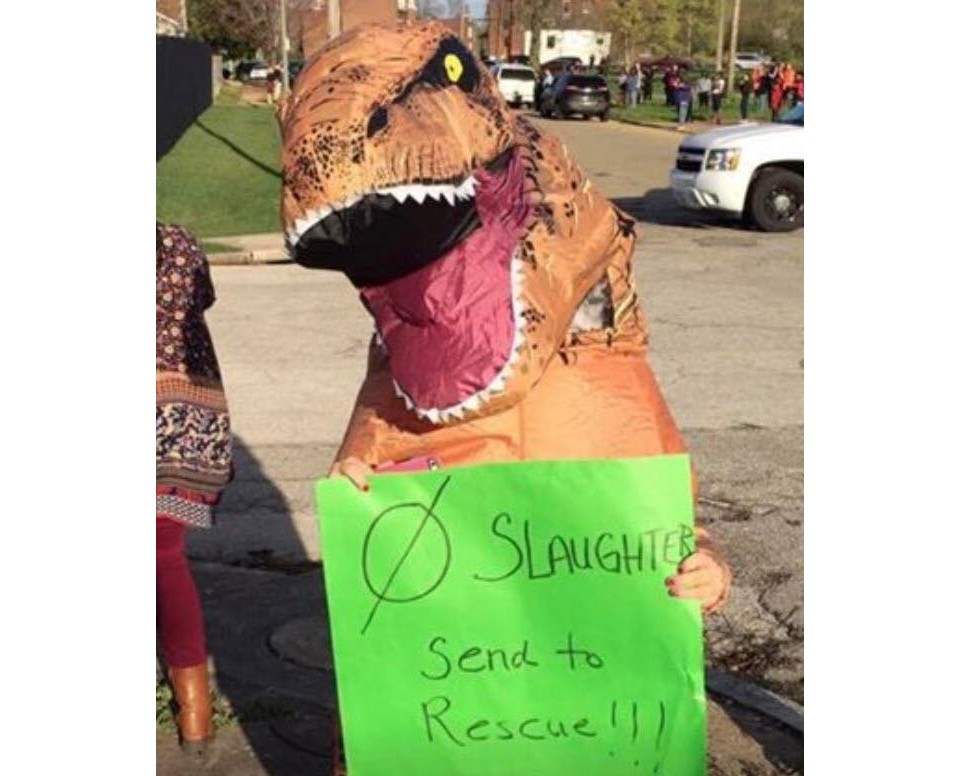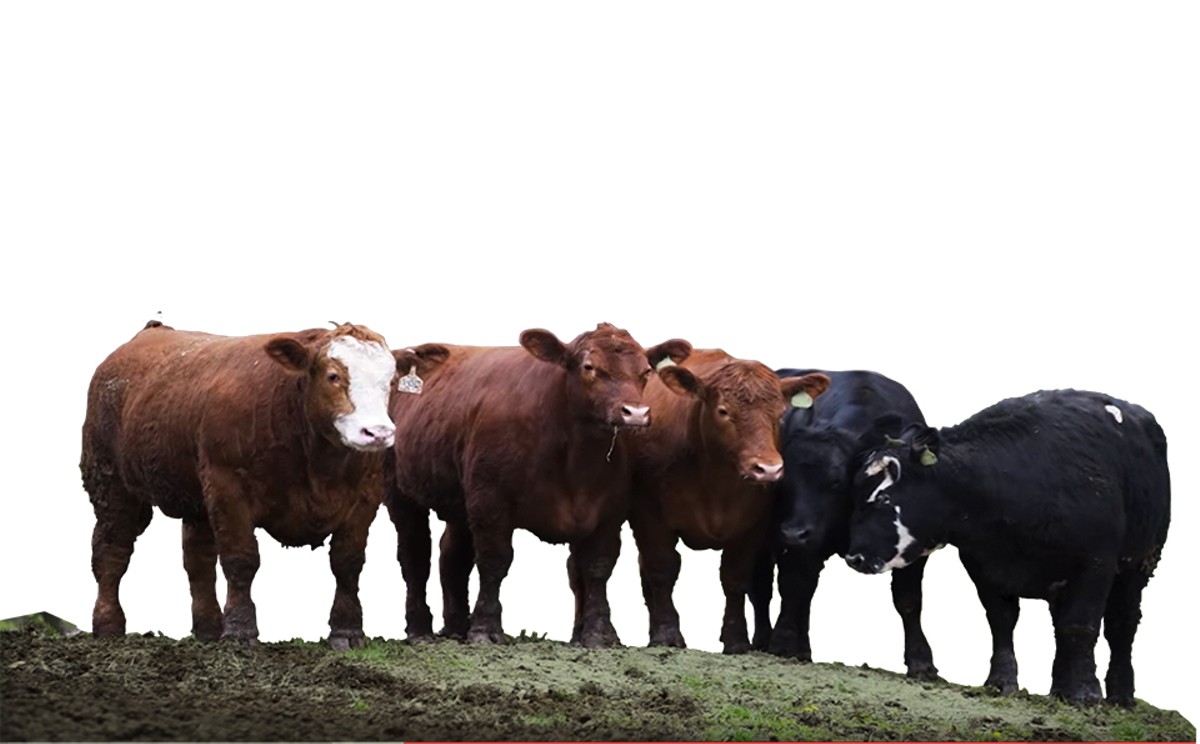
Act 2: "Free Chico!"
Within minutes, the group of steers put more than a mile between themselves and the slaughterhouse. But now the group split up. One trotted into a backyard, three wandered into a machine shop's parking lot and the others infiltrated the gated compound of the Little Sisters of the Poor nursing home.
Mother Gonzague Castro, then-superior of Little Sisters of the Poor: I got the call from the front desk, and she says to me, "There's cows out the front yard." And I say, "No, there can't be cows in the front yard," and she said, "Yeah, there are, they're trying to get in." Well, they were, they came right to the front door before the police got there. They really frightened the people who were out there.
Carson: They were trapped there. It's a fairly large, half-acre, fenced-in area.
Castro: They were pretty mild; they were grazing on the grass. They really didn't get excited until the company that had lost them brought a big trailer, and they backed it up into our property. They tried to corral them onto that trailer.
Carson: The police had the mobile reserve, the tactical guys with some rifles and stuff, just in case it got out of hand. So the cows were running around, and you had a bunch of city folk trying to corral this cow. That's not the St. Louis Police Department's forte, corralling cows. ... So they backed their trailer there to try to get the cows, and they got two. And then there's one cow, Chico, that did not want to go in the trailer.
Cornered by officers, Chico instead charged through the iron bars of the compound gate, crashing through as onlookers scrambled away. In the violence of his charge, Chico's head caught on the underside of the metal bars that he'd just wrecked. Carson snapped a photo, freezing the moment as the steer's two front hoofs lifted off the ground, one eye seeming to stare directly at the viewer.
Castro: It was really surprising. He broke the steel, and the concrete was all busted out. Everything was all damaged.
Carson: The way he blew through that iron fence, I don't think I would have been standing that close if I knew he was going to do that. Fortunately he ran away from me.
Sasha Monik, St. Louis Animal Rights Team: That image of Chico busting through the gate, it went viral. It showed what they can do, that these animals are incredibly strong. But it also showed, you know, none of the policemen got trampled. We're not under threat of the animals. They're domesticated. They just want to live, and they can't.
Castro: We all eat the meat — what can you say? That comes from the cows. These cows were special in the sense that they broke loose, the man forgot to shut the door, whatever happened, and they went running around. They were so happy to be free. Sometimes I think that cows never even know their freedom. These cows got to know their freedom.
By now, TV news helicopters were broadcasting the chase to affiliated stations across the country. Thousands of people were tweeting and streaming footage of the steers' efforts to evade capture.
With help of additional fencing, the officers and slaughterhouse workers soon corralled five steers. Chico kept running.
Carson: So Chico is loose in the streets of St. Louis, and I start running after Chico. One of the St. Louis city police lieutenants saw me and said, "Jump in," so I jumped into a St. Louis city police car with them, and so we're following. ... This cow was outsmarting them at every turn. They tried to block him off, and Chico would run around them. Chico went across multiple roads, evaded at least three or four attempts to corral him.
Smith: He was a diehard. It's about five o'clock in the evening; he was running down Tucker, sweating, slobbering and slipping, but he was out there.
Carson: Eventually Chico got tired out, and they got Chico cornered into one area. The cops were walking in. People were cheering for Chico.
Kelly Manno, St. Louis radio DJ and podcaster: I was in the carpool to get my daughter from school, and a Facebook live video popped up on my phone of these cows running loose in north St. Louis. I've always been an animal lover, and I knew the minute I saw them that I needed to go down there.
When I [arrived] there was only one cow left to be captured. I stayed out there for at least an hour, because this cow would not give up. At one point I went to the fence, and I was asking a police officer, "Where are you taking these cows?" He wouldn't answer. ... I remember that no one would talk to me. Then I remembered that I had a dinosaur costume. I made a sign that said, "Don't slaughter, send to rescue."
Carson: Then this woman in a T-Rex costume showed up! It was one of the crazier things I've seen in St. Louis. You've got hundreds of people, and this lady in a T-Rex costume — everyone from the neighborhood is around. That's where I shot the video of the woman who said his name is "Chico Suave."
As police attempted to capture the last cow, Carson posted his video to Twitter. In the clip, Carson asks a woman in bright pink hair about the name of the cow behind the fence. "He's Chico, Chico Suave," she says, explaining, "He's smooth, he earned his stripes." Beyond the fence, the video shows Chico juking around two police officers cowering behind a tree. The crowd chants, "Free Chico! Free Chico!"
Manno: The crowd was amazing; it was like a carnival. They had made signs, and they'd already named him by the time I got down there. Every time the cow would dodge a police officer and not be captured, the crowd would go wild. When he was caught, everybody booed.
Carson: It was like this cheer, and a groan at the same time that the excitement was over.
After Chico's capture, Manno dashed the three blocks back to her minivan. (She had to unzip the dinosaur costume so she could drive.) She followed the trailer to the slaughterhouse, where an employee told her Chico would cost $1,800 to redeem. She told him she'd be back the next day with the money.
Manno: And there was this moment at a stoplight when the light was red, and this brown cow, that I just had watched fight for his life, stuck the side of his nose out the back of the trailer. I swear to God he made eye contact with me. The look on his face was heartbreaking. ... It was like, "I tried, I outran the cops for hours, and I'm back here again. I lost."
For me, it was just seeing that will to live, and I just knew that I had to save this cow no matter where he was going.

Act 3: A Negotiation, Not a Rescue
The St. Louis Six were back at the slaughterhouse, but they were about to embark on a second, no less fraught journey. The night of March 30, Manno started a GoFundMe to raise $1,800 to redeem Chico — but she was far from the only one moved to action. A second GoFundMe, started by Chesterfield native Adam Brewer, was featured (and linked) within the Post-Dispatch's coverage of the escape. By Friday, Brewer had raised more than $10,000. Manno had more than $2,000.
Standing in their way was the slaughterhouse's owner, Omar Hamdan.
Susie Coston, national shelter director, Farm Sanctuary: A number of sanctuaries talked to the owner of the slaughter facility. He was going back and forth whether he would donate them or not because he would be taking a loss.
Adam Brewer: More meat eaters contacted me more than anyone. They were like, "Hey, I'm not a vegetarian, not a vegan, but I really want to see these cows survive." Another message would be like, "I'm working on myself, I'm not a vegetarian, but I'm trying to be."
Manno: When I saw those animals in distress, the last thing that crossed my mind was whether I'd had a cheeseburger. I saw an animal suffering and I wanted to help. I am an animal lover. The fact that I'm not a vegetarian never crossed my mind.
Monik: I donated to Adam's GoFundMe and I somehow started talking to him. It went from some people donating, then someone else. The next day it really started getting in motion. It was like, "We can't save just one cow, we have to save all the cows."
Coston: There were so many people reaching out to the owner, and I actually think it was starting to get to him. But the second money comes into play, all bets are off.
Brewer: Early on, the idea was we weren't going to pay anything for the cows. We had $10,000 at this point to cover the necessary vet fees while we wait for a rescue. I figured it would be a week, tops, to find a sanctuary to take them.
Manno: In the morning, I was able to get a hold of Omar [Hamdan]. We talked on the phone for a long time. I told him, "I don't expect you to understand why I'm doing this, I don't expect you to sympathize with the cow, I understand you run a business, you have a family. I just want to give you what you would have gotten for that cow, and I want to come and get it." And he said, "Yes." He agreed to it.
Coston: It went from a rescue to a negotiation, and it sucks. I'm not saying it's a bad thing that the cows got rescued. That's the beautiful part. We're not all going to agree with what happened. They just could have been rescued, in my opinion, for free.
Brewer: I'm a fan of Omar; I still talk to him to this day. Omar was probably my favorite person I met out of all of this, because he was real, he was real to himself. He viewed it the way I viewed it: two people wanting to find the common ground.
Manno: He's a horrible person — he told me he would give me the cow; I secured a farm for him and transportation. Omar led me to believe that he was coming to meet me with this cow. We were supposed to meet at six, and at 5:45 he was saying he was almost there, and he never showed up. To this day I have no idea why.
It wasn't just Manno left frustrated by Hamdan. Coston and Farm Sanctuary, a New York-based rescue organization, saw Hamdan's demand for payment as a deal breaker and withdrew from negotiations. (Hamdan did not respond to multiple requests for comment.)
Coston: We stand by our ethics for a reason. We have so many escaped cows on our farm, and not one of them was paid for. We negotiate them away. It's not unique, and that's why many people were frustrated. Because in the middle of those negotiations someone stepped in with a big checkbook. ... Other animals are going to die on the backs of these animals, because you gave the owner the opportunity and the money to do that.
Brewer: Once Farm Sanctuary bailed out, no one else was doing it. But I felt like I still had a bargaining chip to at least get to other rescues. I was talking to the slaughterhouse, and we had enough money to rent a [temporary foster home].
Monik: I was planning to do a protest vigil at the slaughterhouse. The cows weren't released or paid for, they were back at the slaughterhouse, and they were going to be sent to their killing. We just really wanted to save them.
Brewer: Omar stopped taking my calls. He was really overwhelmed with things. He was getting messages from people not understanding his culture, saying that it was an Arab thing, that it was a form of terrorism. At that point I was freaked out. I still had all this money.
Manno: I reached out to Adam and said, "We're trying to do the same thing; let's work together." We were stuck with all this money, and no cows. So I called the best animal-rescue resource I know — my sweet friend Kelly Backes.
Kelly Backes and her husband, pro hockey player David Backes, are vegans and animal rescue supporters with deep local roots. Backes spent ten years playing for the St. Louis Blues, and in 2013 the couple founded the nonprofit Athletes for Animals. By the time of the slaughterhouse escape in 2017, David had been traded to Boston. Still, Kelly Backes quickly donated to Manno's GoFundMe campaign.
Kelly Backes: Kelly [Manno] is absolutely out of her mind, and we love her. She was the one who finally said, "You have to help, do something."
Manno: I probably cried on the telephone to her for an hour over these cows, trying to figure out what to do. She said she would work on it and call me back.
Brewer: Sunday rolls around, and at this point there were so many people devastated by the possibility that they wouldn't make it. There were so many eyes out on it that we couldn't let the cows die.
Backes: Right away my mind immediately went to Gentle Barn and Jay and Ellie. It just started snowballing so quickly ... the next day he was on a flight.
The Gentle Barn was founded in 1999 by Ellie Laks. The California-based organization has a history of rescuing large animals, such as cows and horses, which it aims to rehabilitate and give sanctuary. But beyond her love of animals, Laks had special reason to pay attention to the St. Louis Six — she herself grew up here.
Ellie Laks, founder, Gentle Barn: We were just watching it on the national news along with everybody else. It was so devastating to watch. I love animals so much and I tend to internalize what they might be feeling, and so just watching them run, watching their desperation, not knowing which direction to go, watching people try to catch them, watching the cars coming — it was very hard to watch.
Jay Weiner, co-founder, Gentle Barn: Animals escape from slaughterhouses all the time. A trailer will tip over, or they've fallen off or escaped the slaughter trucks. It's something we've dealt with in the history of the Gentle Barn. Whether they're seen gallivanting through the town, that's not very typical.
Backes: That evening Jay called me. And he was like, "What are you guys thinking?" I said, "Just do whatever you can and we'll do whatever we can to help."
Brewer: I was excited about Gentle Barn, because they had the resources to take all six. ... I kept stressing it wasn't just Chico, it wasn't about a celebrity cow. It's about the lives of these six cows representing the billion-plus other cows that senselessly die every year.
Manno: Kelly [Backes] called me back, and she said, "I want you take the money and donate it to Gentle Barn." I donated my money at like 10 p.m. that night; Adam did the same. ... It was such a weight off my shoulders, because I was digging myself in a hole. At that point, Omar was not being responsive, nor was he being realistic. So Jay and Ellie saved the cows.
Laks: Jay and I talked about it, and he packed and caught a red eye and got to St. Louis in the morning to stop their slaughter.
Weiner: I was definitely very concerned that I wouldn't get there in time. ... When I started talking directly to the slaughterhouse owner, he sounded pretty finished and done with dealing with the kind of pressure he had been receiving. He was concerned about the financial situation. They were very unwilling to release the animals without pay.
Monik: I went to the slaughterhouse on Monday. When Jay arrived, he went straight in. We were standing out there, so anxious and tired, waiting, like, "Please tell us everything worked."






